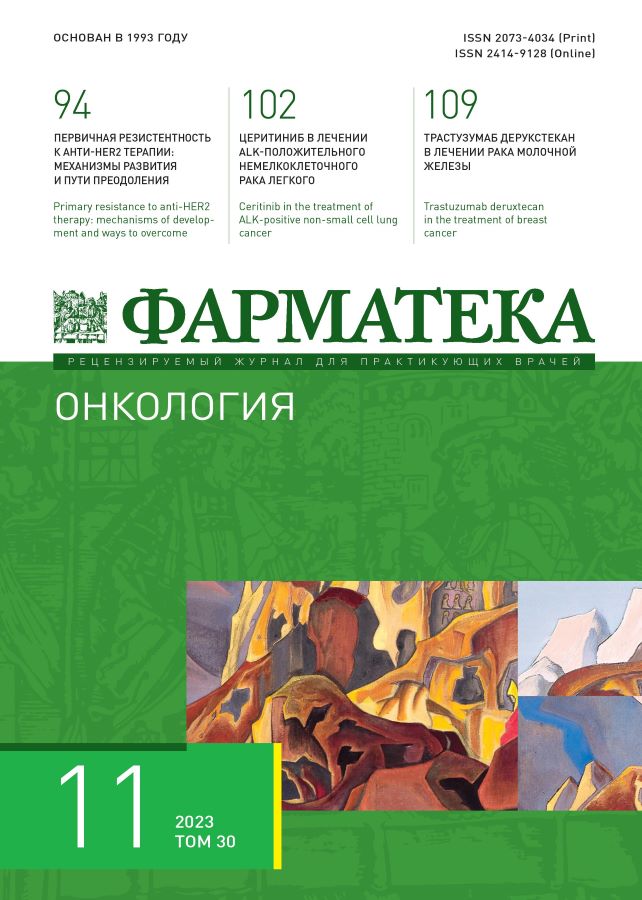Trastuzumab deruxtecan in the treatment of breast cancer
- Authors: Semiglazov V.F.1, Krivorotko P.V.1, Bekkeldieva N.B.1, Gorina A.O.1, Komyakhov A.V.1, Paltuev R.M.1, Tabagua T.T.1, Ereshenko S.S.1
-
Affiliations:
- N.N. Petrov National Medical Research Center of Oncology
- Issue: Vol 30, No 11 (2023)
- Pages: 109-112
- Section: Pharmacological properties of drugs
- URL: https://journals.eco-vector.com/2073-4034/article/view/625832
- DOI: https://doi.org/10.18565/pharmateca.2023.11.109-112
- ID: 625832
Cite item
Abstract
HER2-positive breast cancer (BC), defined by HER2 gene amplification and/or overexpression at the protein level, accounts for approximately 20% of all BC cases. The use of the anti-HER2 drug trastuzumab, developed 20 years ago, changed the natural course of the disease and improved the clinical outcome. Subsequent use of “dual blockade” (trastuzumab-pertuzumab; trastuzumab-lapatinib), as well as an antibody-drug conjugate (T-DM1), improved relapse-free and overall survival of patients with HER2-positive BC. Further progress in anti-HER2 targeted therapy is associated with the use of a new generation of conjugates – trastuzumab-deruxtecan (T-Dxd). In addition, a number of clinical trials on the successful use of T-Dxd in patients with lower HER2 protein expression (HER2 1+ or 2+ with negative in situ hybridization (ISH-) levels, detected in half of BC patients have been performed.
Full Text
About the authors
V. F. Semiglazov
N.N. Petrov National Medical Research Center of Oncology
Author for correspondence.
Email: vsemiglazov@mail.ru
ORCID iD: 0000-0003-0077-9619
Dr. Sci. (Med.), Professor, Corresponding Member of RAS, Oncologist, Head of the Scientific Department of Tumors of the Reproductive System, Chief Researcher
Russian Federation, Saint PetersburgP. V. Krivorotko
N.N. Petrov National Medical Research Center of Oncology
Email: vsemiglazov@mail.ru
Russian Federation, Saint Petersburg
N. B. Bekkeldieva
N.N. Petrov National Medical Research Center of Oncology
Email: vsemiglazov@mail.ru
Russian Federation, Saint Petersburg
A. O. Gorina
N.N. Petrov National Medical Research Center of Oncology
Email: vsemiglazov@mail.ru
Russian Federation, Saint Petersburg
A. V. Komyakhov
N.N. Petrov National Medical Research Center of Oncology
Email: vsemiglazov@mail.ru
Russian Federation, Saint Petersburg
R. M. Paltuev
N.N. Petrov National Medical Research Center of Oncology
Email: vsemiglazov@mail.ru
Russian Federation, Saint Petersburg
T. T. Tabagua
N.N. Petrov National Medical Research Center of Oncology
Email: vsemiglazov@mail.ru
ORCID iD: 0000-0003-1471-9473
Russian Federation, Saint Petersburg
S. S. Ereshenko
N.N. Petrov National Medical Research Center of Oncology
Email: vsemiglazov@mail.ru
ORCID iD: 0000-0002-5090-7001
Russian Federation, Saint Petersburg
References
- Семиглазов В.Ф., Семиглазов В.В. Рак молочной железы: биология, местное и системное лечение. М., 2014. 352 с. [ Semiglazov V.F., Semiglazov V.V. Breast cancer: biology, local and systemic treatment. M., 2014. 352 p. (In Russ.)].
- Semiglazov V., Eiermann W., Zambetti M., et al. Surgery following neoadjuvant therapy in patients with HER2-positive locally advanced or inflammatory breast cancer participating in the NeOAdjuvant Herceptin (NOAH) study. Eur J Surg Oncol. 2011;37(10):856–63. doi: 10.1016/j.ejso.2011.07.003.
- Gianni L., Eiermann W., Semiglazov V., et al. Neoadjuvant chemotherapy with trastuzumab followed by adjuvant trastuzumab versus neoadjuvant chemotherapy alone, in patients with HER2-positive locally advanced breast cancer (the NOAH trial): a randomised controlled superiority trial with a parallel HER2-negative cohort. Lancet. 2010;375(9712):377–84. doi: 10.1016/S0140-6736(09)61964-4.
- Gianni L., Pienkowski T., Im Y.H., et al. Efficacy and safety of neoadjuvant pertuzumab and trastuzumab in women with locally advanced, inflammatory, or early HER2-positive breast cancer (NeoSphere): a randomised multicentre, open-label, phase 2 trial. Lancet. Oncol. 2012;13(1):25–32. doi: 10.1016/S1470-2045(11)70336-9.
- von Minckwitz G., Procter M., de Azambuja E., et al. Adjuvant Pertuzumab and Trastuzumab in Early HER2-Positive Breast Cancer. [published correction appears in N. Engl. J. Med. 2017;377(7):702] [published correction appears in N Engl J.Med. 2018;379(16):1585]. N Engl J Med. 2017;377(2):122–31. doi: 10.1056/NEJMoa1703643.
- Verma S., Miles D., Gianni L., et al. EMILIA Study Group. Trastuzumab emtansine for HER2-positive advanced breast cancer. N Engl J Med. 2012;367(19):1783–91. doi: 10.1056/NEJMoa1209124. [Epub 2012 Oct 1. Erratum in: N Engl J Med. 2013;368(25):2442.].
- von Minckwitz G., Huang C.S., Mano M.S., et al. Trastuzumab Emtansine for Residual Invasive HER2-Positive Breast Cancer. N Engl J Med. 2019;380(7):617–28. doi: 10.1056/NEJMoa1814017.
- Cortés J., Kim S.B., Chung W.P., et al. DESTINY-Breast03 Trial Investigators. Trastuzumab Deruxtecan versus Trastuzumab Emtansine for Breast Cancer. N Engl J Med. 2022;386(12):1143–54. doi: 10.1056/NEJMoa2115022.
- Ergun Y., Ucar G., Akagunduz B. Comparison of HER2-zero and HER2-low in terms of clinicopathological factors and survival in early-stage breast cancer: A systematic review and meta-analysis. Cancer Treat. Rev. 2023;115:102538. doi: 10.1016/j.ctrv.2023.102538.
- Tarantino P., Hamilton E., Tolaney S.M., et al. HER2-Low Breast Cancer: Pathological and Clinical Landscape. J Clin Oncol. 2020;38:1951–62.
- Modi S., Jacot W., Yamashita T., et al. Trastuzumab deruxtecan in previously treated HER2-low advanced breast cancer. N Engl J Med. 2022;387:9–20.
- Панферова Е.В., Тепикина Г.Н., Барышников и др. Клинический случай успешного лечения HER2-low рака молочной железы трастузумабом дерукстеканом. Вопросы онкологии. 2023;69(4):757–60. [Panferova E.V., Tepikina G.N., Baryshnikov et al. Clinical case of successful treatment of HER2-low breast cancer with trastuzumab deruxtecan. Oncology issues. 2023;69(4):757–60. (In Russ.)]. doi: 10.37469/0507-3758-2023-69-4- 757-760.
- Moy B., Rumble R.B., Carey L.A., et al. Chemotherapy and targeted therapy for endocrine-pretreated or hormone receptor–negative metastatic breast cancer: ASCO guideline rapid recommendation update. J Clin Oncol. 2023;41:1318–20.
- Rugo H., Bianchini G., Cortes J., et al. Optimizing treatment management of trastuzumab deruxtecan in clinical practice of breast cancer. ESMO. Open 2022;7:100553.
Supplementary files








